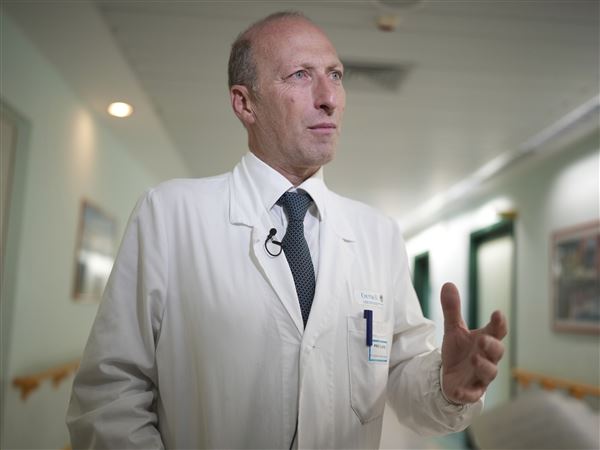Highmark’s attempt to recover, by way of a lawsuit, hundreds of millions of dollars in chemotherapy-related “markups” paid to UPMC over the past four years could be a “landmark and precedent-setting event,” according to a medical billing expert.
But that precedent will be established only if Highmark wins its case and the money — and prospects for such a victory are hard to handicap, because the lawsuit itself is so novel.
On Wednesday, Highmark Inc. sued UPMC over alleged “pricing manipulation” related to the way Pittsburgh’s leading hospital system bills for oncology and cancer-related treatments. The lawsuit, filed in Allegheny County Court of Common Pleas, represents yet another in a series of flare-ups between Highmark and UPMC over cancer billing. In February, Highmark announced that it would no longer pay certain markups and facilities fees to UPMC, starting April 1.
Those markups, Highmark says, cost the health insurer hundreds of millions of dollars. Cancer treatments that once cost Highmark $10,000 now cost more than $30,000.
“Highmark is taking legal action in a continued effort to safeguard consumers from [UPMC’s] irrational billing practices,” Highmark spokesman Aaron Billger said. “UPMC has managed, through billing manipulation, to increase costs by $300 million [over four years] without any improved outcomes for cancer patients.”
And while patients may not always notice the increased charges, because their insurance usually picks up the bill, they are affected in the long run because they pay higher premiums. And patients may also be hit with larger co-payments or co-insurance bills, depending on the design of their health plan.
If it wins its case, Highmark says, it would return the money to its customers.
Locally, the issue might appear to be just another legal dust-up between two arch-rivals that can’t go more than a few months without suing each other. But the issue of oncology markups — and the broader issue of hospital systems shifting care away from less costly physicians’ clinics and into more expensive hospital outpatient clinics — are of national interest in the health care world.
It’s called “upcoding,” said Rebecca A. Reier, president of Med-Econ Inc., an Ohio company that specializes in medical billing and related litigation. In effect, hospitals are “billing for a service that is a higher level of care than is actually performed,” she said.
“Changing the facility type from office to hospital-outpatient often results” in health systems profiting on both increased medication costs as well as the facility fee differential, “without changing the nature or requirements of the service,” Ms. Reier said. “In some circumstances, the Office of the Inspector General has considered this fraud.”
But those circumstances typically involve Medicare going after a hospital network, not an insurer doing battle with a hospital over price manipulation — which is why this legal case will be so closely watched. As test cases go, this is a big one: Highmark, a Blue Cross Blue Shield insurer, is one of the largest health carriers in the U.S., and UPMC runs the largest network of cancer treatment centers in Western Pennsylvania.
The “manipulation,” Highmark says, comes by way of UPMC’s charging higher rates for chemotherapy infusions by billing them on a “hospital outpatient basis.” Medicare rules and the hospital’s own contract with Highmark allows UPMC to claim much higher reimbursements when the chemotherapy is provided in an outpatient hospital setting, rather than in a doctor’s office.
Highmark also has objected to UPMC’s decision to designate two of its cancer clinics, UPMC Hillman Cancer Center and the cancer program at UPMC Passavant, as outpatient clinics of Oakland’s Magee-Womens Hospital as of June 1. It’s an accounting move that will save UPMC millions of dollars a year on therapeutic cancer drugs because Magee is able to order those drugs at a special discount, thanks to a federal program meant to provide cheaper drugs to impoverished populations.
Last year, Highmark voiced similar objections when Westmoreland County’s Arnold Palmer Cancer Pavilion — a joint venture between UPMC and Excela Health — started billing health insurers as if the treatments were being administered at UPMC McKeesport, where the treatments are three times as expensive.
Moves like that — giving clinics new titles and designations in order to gain higher reimbursements — are a breach of contract, according to the lawsuit. That’s because Highmark and UPMC are obliged to “cooperate [in order to] ensure quality improvement, cost containment and coordination of health services. … The shifting of billing for [oncology services] materially alters the consideration bargained for by Highmark” and UPMC.
The lawsuit claims that UPMC and its various subsidiaries “have profited enormously by unilaterally shifting the billing of claims for these oncology drugs and services, moving claims submission from an established practice of physician-based billing to billing the charges for these drugs and services at higher hospital outpatient rates … despite the fact that the drugs were administered and services were rendered by the same physicians and group practices.”
But UPMC says Highmark is the one breaching agreements — its own payment agreements with UPMC, as well as the June consent decree signed by the two health titans, and brokered by state officials.
That consent decree stipulates that Highmark and UPMC are supposed to settle their billing differences by way of arbitration, with an arbiter to settle whether UPMC owes Highmark for historical overpayments, or whether Highmark owes UPMC for bills that have gone unpaid since April 1. And dispute-resolution guidelines set up in the consent decree are meant to deal with future rate disagreements.
In filing the lawsuit, Highmark is circumventing the very dispute resolution process it agreed to less than three months ago, said UPMC spokesman Paul Wood.
“Highmark’s latest lawsuit is not only a meritless attack on a reimbursement system Highmark itself designed and endorsed, but also a blatant violation of the consent decree,” he said. “Highmark is clearly attempting to forestall a negative decision in that arbitration. … It should be noted that Highmark’s own Allegheny Health Network has long engaged in these same billing practices, making this lawsuit another in the long line of duplicitous acts and bad behavior by Highmark.”
While the lawsuit is looking to recover past payments, the billing price remains important going forward because, as per that June consent decree, even after the Jan. 1 divorce between the two health care companies, Highmark customers are still allowed to use UPMC cancer facilities, including Hillman, under some circumstances:
“Highmark subscribers may access, as if in-network, UPMC services, providers, facilities and physicians involved in the treatment of cancer, if a patient’s treating physician determines that a patient who is diagnosed with cancer should be treated by a UPMC oncologist and the patient agrees to be so treated,” the agreement says.
First Published: September 3, 2014, 6:15 p.m.
Updated: September 4, 2014, 4:38 a.m.
















